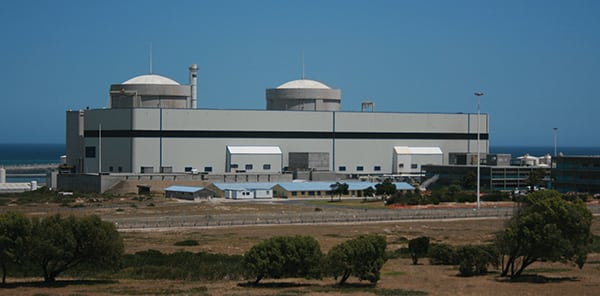South Africa Looking at Nuclear Power to Solve Load-Shedding Crisis
South African officials, faced with continued power outages that are hurting the country’s economy, are turning to nuclear power in an effort to support a more reliable supply of electricity.
The country has experienced intermittent blackouts, part of a process known as load shedding, since 2008. The outages, imposed by state-owned utility Eskom, have escalated to record levels this year as the power company cuts the electricity supply to keep the grid from collapsing, as demand for power outstrips supply. The outages usually last two to four hours, at times more than once each day. Some blackouts this year have gone as long as 10 hours.
Government officials said Eskom’s energy availability factor, which measures how much electricity the grid can handle, was recently at just 60%—meaning more than a third of electricity customers were without access to power. Officials on Dec. 12 said they will launch a bidding process early next year to procure at least 2.5 GW of nuclear power, at the same time acknowledging that additional energy might not be available for a decade.
Kgosientsho Ramokgopa, South Africa’s electricity minister, told a news conference Tuesday: “We are excited about the prospects [for nuclear power] and we are confident about our ability to ensure that within a reasonable period of time we are able [to announce] preferred bidders.”
South African President Cyril Ramaphosa has said the country needs more clean energy resources. South Africa is among the world’s most carbon-intense economies, with coal-fired power supplying about 80% of the country’s electricity. Eskom has 15 coal-fired facilities in South Africa, many of them older units prone to breakdowns and maintenance issues, which also has impacted the power supply.
Africa’s Only Nuclear Plant
South Africa has the African continent’s only operating nuclear power plant. The 1,860-MW Koeberg facility near Cape Town, which came online in 1984, has two Framatome-designed pressurized water reactors. Koeberg supplies about 5% of the country’s electricity. Government officials are waiting on regulatory approval to extend the plant’s operating license for another 20 years. The current license expires in July 2024.

The country has previously looked at expanding nuclear power, but proposed deals with the U.S., Russia, and South Korea to add as many as eight new reactors were annulled by a court in 2017.
Zizamele Mbambo, a senior official in the country’s energy ministry, on Tuesday said South Africa’s new plan looks to have the first new reactor commissioned in by 2032 or 2033. Mbambo, discussing the plan to accept bids to build new reactors, said, “We must issue an open and transparent tender that makes sure there is cost competitiveness.”
Opponents of the current government quickly criticized the plan. The Democratic Alliance, the country’s main opposition political party, charged that Rosatom—Russia’s state-owned nuclear group—would be the government’s preferred partner for new nuclear generation. Officials, though, in Tuesday’s news conference did not mention any companies that could be asked to bid for new projects.
—Darrell Proctor is a senior associate editor for POWER (@POWERmagazine).